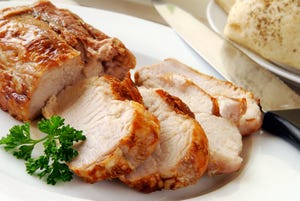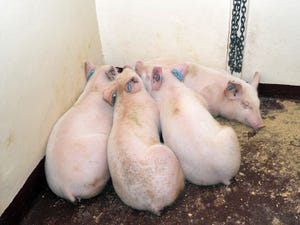California’s Prop. 12 to have far-reaching impact
Golden State voters approve measure aiming to dictate how livestock in other states are raised.
November 7, 2018

Compiled by Kevin Schulz
Another election season is in the books, and with it comes another attack on animal agriculture.
California voters approved Proposition 12, which establishes minimum space requirements of 24 square feet per breeding gilt or sow. Producers raising veal calves will be required to provide 43 square feet of floor space per animal and egg-laying chickens will require 1 square foot per hen. This measure, when it becomes state law in 2020, will also ban the sale of veal, pork and eggs produced by animals confined in areas below the minimum space requirements.
This sales stipulation applies to all of these products sold in the Golden State, regardless of where the animals are raised. This is not sitting well with the National Pork Producers Council, issuing a statement Wednesday morning.
“Prop. 12 will have severe negative consequences for California livestock farmers and low-income households in the state, driving up production costs and food prices just so the food elitists can feel good about what they’re eating. The initiative also could force hog farmers in other states who want to sell pork in the populous California market to switch to alternative sow housing systems at significant cost to them and consumers everywhere.”
A blog, posted Nov. 1 on the NPPC website, quantified the impact such a measure would impose on the swine industry. “Brian Buhr, professor in applied economics at the University of Minnesota, in a 2010 study estimated a cost of between $1.9 billion and more than $3.2 billion for the pork industry to move away from individual pens for sows. That would raise the price of pork, which in turn would start a cycle of consumers demanding less pork followed by higher prices — at a cost to consumers of an estimated $5 billion, according to Buhr.”
That NPPC blog goes onto say: “Some hog farmers likely would go out of business, further reducing the production (supply) of pork and prompting another increase in consumer prices. Of course, animal-rights groups not only know this, they count on it to achieve their goal of significantly reducing meat consumption in America.”
Research has shown that when given a choice, sows prefer remaining in stalls rather than moving freely in an open pen setting. The American Association of Swine Veterinarians supports the use of gestation stalls during a sow’s pregnancy to minimize aggression and competition among sows. Placing sows in stalls also allows for the observation of individual animals for well-being assessment.
The NPPC blog also argues, “California ban on the sale of out-of-state pork (and eggs and veal) is a restraint of interstate commerce, and that’s a violation of the U.S. Constitution, which grants Congress absolute power over trade among the states. (The U.S. Court of Appeals for the Ninth Circuit in Sacramento dismissed a 2014 case brought by six state attorneys general against the egg sales ban, but it did so not on the merits of the case but on procedural grounds and because no ‘actual or imminent’ injury was alleged.)”
California Farm Bureau Federation President Jamie Johansson wrote in the Oct. 31 AgAlert that Prop. 12 is only the latest attempt to play with emotions of California’s well-intentioned voters. “Activists first took advantage of voters’ good intentions 10 years ago, when they successfully sponsored Proposition 2. It requires California farmers to provide more space to chickens, veal calves and hogs. The initiative prohibited California farmers from housing pregnant pigs, veal calves and egg-laying hens in a manner that ‘does not allow them to turn around freely, lie down, stand up, and fully extend their limbs.’
“The California Farm Bureau Federation, other statewide farm groups and the broader business community all opposed Proposition 2. We argued that the measure would reduce California egg production in particular and lead to higher prices.
“Those predictions turned out to have been accurate.
“About a year ago, Purdue University released a study analyzing the impact of Proposition 2 on California egg production and prices. Findings from the study show that California egg production dropped about 35% in the time since Proposition 2 took full effect, while retail egg prices paid by Californians increased as much as 33%.”
You May Also Like



